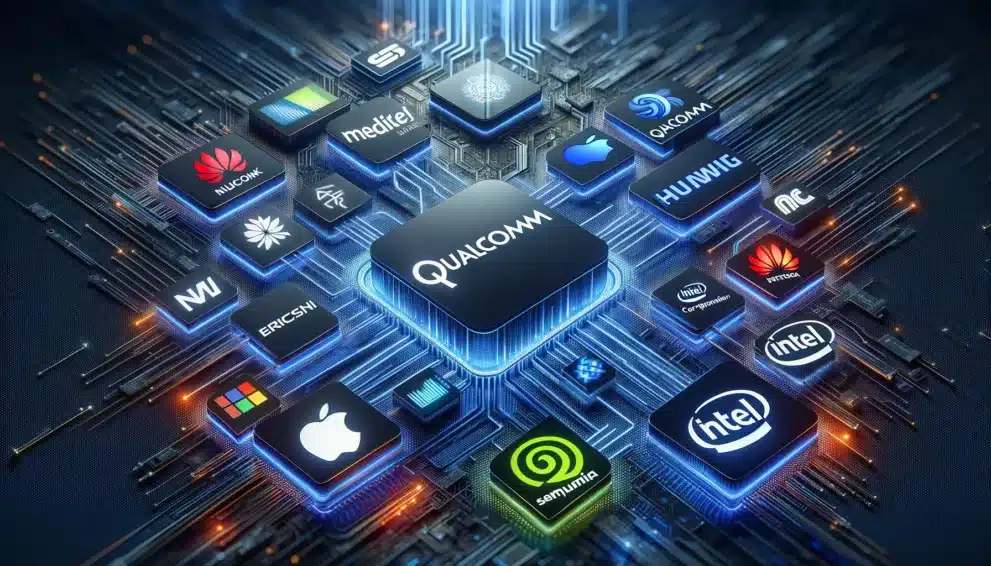
Qualcomm is a multinational corporation known primarily for its innovations in the telecommunications and semiconductor industries. Founded in 1985, the company has its headquarters in San Diego, California, and has played a pivotal role in the development and expansion of wireless communications globally. Qualcomm is perhaps best known for its development of CDMA and LTE technologies, which have been fundamental in advancing cellular communication standards and capabilities. For more on Qualcomm competitors, see below.
The company’s broad product portfolio includes mobile phone processors, with its Snapdragon series being among the most popular in the smartphone market. These processors are renowned for their performance, energy efficiency, and integration of advanced features like 5G connectivity, AI, and high-quality graphics capabilities. In addition to mobile processors, Qualcomm designs and manufactures other chipsets for a variety of applications in devices such as tablets, automobiles, wearables, and more.
Beyond hardware, Qualcomm is also heavily involved in the development of wireless communication standards. The company has been instrumental in the evolution of 3G, 4G, and 5G technologies, holding a significant number of patents related to these standards. This position not only makes it a key player in the telecommunications industry but also a significant recipient of revenue through patent licensing.
Moreover, Qualcomm’s activities are not limited to telecommunications and semiconductors. The company has made strides in other technological areas, including Internet of Things (IoT), automotive communications, and health care. They are actively investing in and developing new technologies to shape the future of wireless communication, autonomous driving, and AI.
Despite facing legal challenges and antitrust investigations related to its patent licensing practices and market position, Qualcomm continues to be a leader in technological innovation, pushing the boundaries of what’s possible in wireless communications and beyond. The company’s continuous pursuit of innovation and growth in various technology sectors positions it as a key influencer shaping the future of global communication and digital technology.
Qualcomm Competitors
Qualcomm operates in a highly competitive and rapidly evolving industry, facing competition in various sectors including semiconductors, telecommunications, and software. Here’s a detailed overview of Qualcomm’s main competitors, focusing on different market segments:
- Mobile Processors and Chipsets:
- MediaTek: Based in Taiwan, MediaTek is a significant competitor in the mobile processor market. Known for providing chips for mid-range and budget smartphones, MediaTek has been expanding its portfolio to include more high-end chips with features such as 5G connectivity.
- Samsung Electronics: The South Korean giant not only manufactures its own smartphones but also develops Exynos processors. These chipsets are used in Samsung’s own devices as well as in products from other manufacturers.
- Apple Inc.: With its A-series chips, Apple designs its own processors for iPhones, iPads, and other devices. While Apple is a customer of Qualcomm for certain components, it’s also a competitor in the chipset market, especially since the development of its custom silicon has reduced its reliance on third-party chip suppliers.
- 5G and Telecommunications:
- Huawei: Despite facing significant challenges due to trade restrictions, the Chinese company is a major player in telecommunications equipment and has been at the forefront of 5G infrastructure and technology.
- Ericsson and Nokia: Both companies are key players in the telecommunications equipment sector, providing infrastructure, software, and services for telecommunications networks. They are also heavily involved in the development and deployment of 5G networks worldwide.
- Wi-Fi and Connectivity Solutions:
- Broadcom Inc.: A major competitor in the market for Wi-Fi, Bluetooth, and other communication chips, Broadcom supplies a broad range of products for data center, networking, software, broadband, wireless, and storage and industrial markets.
- Intel Corporation: While traditionally known for its dominance in the CPU market, Intel also provides wireless solutions, including Wi-Fi and 5G modems. Although Intel sold its smartphone modem business to Apple, it continues to be a significant player in the network and communication infrastructure sectors.
- Automotive and IoT:
- NVIDIA Corporation: Known for its graphics processing units (GPUs), NVIDIA has also been making significant strides in the automotive sector with its autonomous driving and AI solutions, directly competing with Qualcomm’s initiatives in these areas.
- NXP Semiconductors: Specializing in automotive and IoT semiconductors, NXP competes with Qualcomm in providing chips and solutions for connected vehicles and various IoT applications.
Qualcomm’s competitive landscape reflects the dynamic nature of the tech industry, with each player bringing its own strengths, focus areas, and strategic initiatives. The competition drives innovation and technological advancement, shaping the future of communication, computing, and digital technology.



 Share
Share Tweet
Tweet Share
Share




Comment